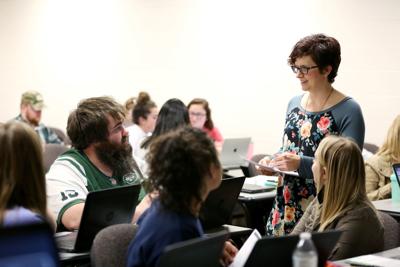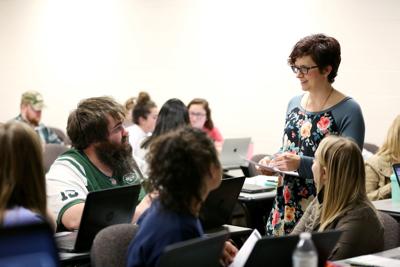
Creating a healthier community through food, mental health, corporate culture and aging are the themes of four events planned by the Initiative for the Creation of the University of Wisconsin-Stout Center for the Study and Promotion of Health and Wellbeing.
“We as an initiative want to engage the expertise we have at UW-Stout to help the community,” said Cristy Linse, director of the initiative.
All programs are free and open to the public.
Relational Aging and the Impact on Older Adult Relationships is planned from 1:30 to 3 p.m. on Wednesday, Nov. 13, at the Shirley Doane Senior Center, 1412 6th St. E., Menomonie. Speaking will be Linse and Amanda Barnett, UW-Stout associate provost and associate professor in the department of human development and family studies.
The session is designed to describe relational aging within the context of intimate personal relationships of older adults and explore the challenges and opportunities associated with the onset of health problems and their impact on both partners. The session is in collaboration with the Chippewa Valley Learning in Retirement community group. To register contact Linse at 715-232-3285
November is National Family Caregiver Awareness Month.
Kindness Kitchen: Empowering Changes Through Empathy from noon to 1:30 p.m. on Tuesday, Nov. 19, at Stepping Stones, 1602 Stout Road, Menomonie, will teach participants how to prepare healthy meals when resources are limited and discuss the social determinants of health as they relate to making choices about health and well-being.
Presenting will be Kerry Peterson, UW-Stout associate professor in the food and nutrition department; Kris Pawlowski of Stepping Stones food pantry; and Nichole Manson, a community member. To register go here.
The program is co-sponsored by Mayo Clinic Health Systems.
“The Ripple Effect” documentary will be part of a miniresource event from 11:30 a.m. to 2:30 p.m. on Wednesday, Dec. 4, in the UW-Stout Memorial Student Center ballrooms. The film focuses on one man who attempted suicide and his advocacy to increase awareness, reduce stigma and improve mental health.
Local resource tables will be up until 12:15 p.m., when the documentary will be shown. A panel discussion will be held from 1:50 to 2:30 p.m. Panelists include: KT Gallagher, director and public health officer for the Dunn County Health Department; Samantha Hamann of UW-Stout Counseling Services; Tyler Miller, Menomonie school district school psychologist; and Rachel Funk-Johnson, owner of Happy Apple Therapy in Menomonie and a UW-Stout alumna. There also will be an opportunity for audience response and comment.
Marshfield Clinic Health System is co-sponsoring the event. Register here.
Fostering Healthy Minds in the Corporate Culture will be held from 11 a.m. to noon on Tuesday, Feb. 4, at the student center ballrooms. The focus will be to cultivate mindfulness in the corporate culture. Ann Brand, UW-Stout adjunct faculty, will engage participants in understanding what mindfulness is and the benefits of adopting it as a lifelong practice. Register here.
The UW-Stout Cross-Disciplinary Collaboration Committee provided grant funding for nearly all of the events to offset costs of food.
The idea for a health center at UW-Stout started about four years ago with Bob Salt, dean of the College of Education, Hospitality, Health and Human Sciences. The center could provide programs, conferences, workshops and other events for those in the health and wellness fields to help continue their learning. Yearly conferences could help the public learn more about health care options, including affordability and availability. The initiative supports Health Dunn Right, a county health coalition, that includes the university as well as many other community organizations, businesses and non-profit organizations.
Faculty and students would have the opportunity to conduct research through the center and work with the public while giving back to the community. An online giving page has been created to help establish the center, which is expected to be self-sustaining through grants and/or private funding.
[“source=chippewa”]

